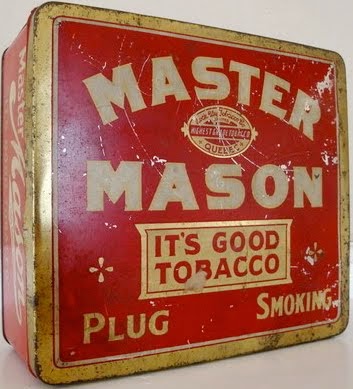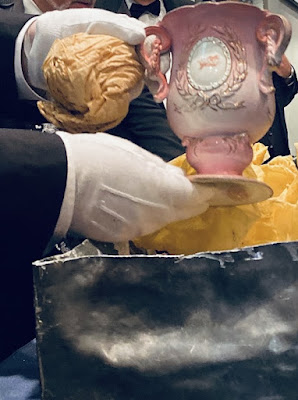 |
| William Preston |
It’s still the seventh for a few more minutes, so happy birthday to William Preston, born on this date in 1742. Preston, of course, is the author of one of the most significant Masonic texts. His Illustrations of Masonry gave shape to the lectures most American lodges use, 250 years after its initial publication.
There’s a lot to talk about regarding Preston and his work, but this edition of The Magpie Mason borrows from another author from a more recent century. Roscoe Pound was made a Mason at Lancaster Lodge 54 in his hometown of Lincoln, Nebraska; later in life, in Massachusetts in 1915, he became Deputy Grand Master, and helped launch The Harvard Lodge. At Harvard University, Pound served as dean of the law school for twenty years.
To be frank, he is one of those famous Masons whose public life sounds admirable, but whose opinions contain ideas that make me cringe, and I’ll leave it to you to investigate that. Regardless, also in 1915, Pound published a book titled Lectures on the Philosophy of Freemasonry in which he upholds four titans of Masonic theory and explains their enormous importance to our Craft. I say this book is essential reading.
William Preston is the first of the quartet he biographized and defined in historical context. It is a succinct Masonic life story that can save you the time needed to peruse any number of research papers printed in old editions of AQC. And I leave that to you as well.
Pound explains how Preston was a man of his times. Call it the Enlightenment or the Age of Discovery or the Age of Reason or what have you, but Preston’s era was characterized by all kinds of pursuits of empirical evidence, from scientific understanding of anatomy to exploration of the planet to understanding the heavens. What had been accepted as knowledge during the Renaissance no longer sufficed; the time for peering into the past had ended.
“That the eighteenth century was the era of purely intellectualist philosophy, naturally determined Preston’s philosophy of Masonry,” writes Pound. “At that time, reason was the central idea of all philosophical thought. Knowledge was regarded as the universal solvent. Hence, when Preston found in his old lectures that among other things Masonry was a body of knowledge, and discovered in the Old Charges a history of knowledge and of its transmission from antiquity, it was inevitable that he make knowledge the central point of his system.”
If you ever wondered how the pillars in the porch of KST came to be adorned with globes, a detail not found in Scripture and is weirdly anachronistic, it was Bro. Preston who metaphorically climbed up and installed them. “In other words, these globes are not symbolic, they are not designed for moral improvement. They rest upon the pillars, grotesquely out of place, simply and solely to teach the lodge the elements of geography and astronomy,” Pound explains.
It’s an insightful examination of the man and his Masonic legacy, and the remarkable portion is served in the concluding paragraphs when Pound explains that what was good for the late eighteenth century lodge isn’t right for today’s (1915) Masons. “I suspect we do Preston a great injustice in thus preserving the literal terms of the lectures at the expense of their fundamental idea. In his day, they did teach—today they do not.” Roscoe Pound, a proponent of new methodology in his profession, the law, wanted new lectures written to teach Masons in the early twentieth century about their modern age.
 |
| Roscoe Pound |
“In Preston’s day, there was a general need, from which Preston had suffered, of popular education—of providing the means whereby the common man could acquire knowledge in general. Today there is no less general need of a special kind of knowledge. Society is divided sharply into classes that understand each other none too well and hence are getting wholly out of sympathy,” Pound continues. “What nobler Masonic lecture could there be than one which took up the fundamenta of social science and undertook to spread a sound knowledge of it among all Masons?”
And finally: “Preston of course was wrong—knowledge is not the sole end of Masonry. But in another way Preston was right. Knowledge is one end—at least one proximate end—and it is not the least of those by which human perfection shall be attained. Preston’s mistakes were the mistakes of his century—the mistake of faith in the finality of what was known to that era, and the mistake of regarding correct formal presentation as the one sound method of instruction. But what shall be said of the greater mistake we make today, when we go on reciting his lectures—shorn and abridged till they mean nothing to the hearer—and gravely presenting them as a system of Masonic knowledge? Bear in mind, he thought of them as presenting a general scheme of knowledge, not as a system of purely Masonic information. If we were governed by his spirit, understood the root idea of his philosophy, and had but half his zeal and diligence, surely we could make our lectures, and through them our lodges, a real force in society…. I hate to think that all initiative is gone from our Order and that no new Preston will arise to take up his conception of Knowledge as an end of the fraternity, and present to the Masons of today the knowledge which they ought to possess.”
I can see how preserving remnants of Prestonian lectures in our degrees today fossilizes the fraternity in the amber of the 1700s. (Is that perceived as irrelevance by some who disappear after the Third Degree? Or the First?) But you have to be careful what you wish for.
If you know Roscoe Pound from outside Freemasonry, then you are aware of his thinking in the legal profession and on social issues. This public Pound of 1915 seems to be mostly forgotten today, but he would be at home among, say, the city prosecutors who refuse to prosecute criminals. His call for new lectures—and he stipulates a careful trial process, although I didn’t quote it above—isn’t nonsensical, but I’d worry how that would go. Would understanding the Physical Senses be replaced by today’s wacky gender theory? Could the Arts and Sciences be supplanted by political environmentalism? Might post-colonial revolutionary doctrine convert Solomon into a Phillistine?
I won’t say it can’t be discussed, but you have to be very cautious about reforming Masonic identity.

















